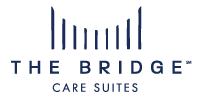Welcome, to The Bridge
Springfield’s Premier 5-Star Post-Surgical Short-Term Rehab facility is conveniently located twelve minutes from St. John’s & Memorial Hospital. The Bridge Care Suites provides top-notch amenities and services. Our commitment is to seamlessly bridge the care gap between the hospital and home, ensuring a smooth transition for our patients.
Welcome, to The Bridge
Springfield’s Premier 5-Star Post-Surgical Short-Term Rehab Facility. Conveniently situated just twelve minutes from St. John’s & Memorial Hospital, The Bridge Care Suites provides top-notch amenities and services. Our commitment is to seamlessly bridge the care gap between the hospital and home, ensuring a smooth transition for our patients.
About Us
With private suites, restaurant-style meals, and caring staff, you’re sure to have a great recovery experience. We have been rated one of the post-surgical short-term rehabilitation centers in Springfield by the U.S. Health for exceptional skilled nursing care, physical therapy staff, patient discharge time, cleanliness, and safety and security.
Experience The Bridge Care
At The Bridge Care Suites, we focus on your total well-being. In addition to our clinical and therapeutic expertise, we offer private amenities designed to help seniors accelerate recovery and return to a regular routine as soon as possible.
Get To Know Us
Accelerate Your Recovery. Get back to the life you love quickly with our patient-centered
short-term rehabilitation services that are centered on the individual needs of seniors.
Contact Us
Hours of Operation: We are open 7 days a week, 24 hours a day.
Call our Bridge Care team 24/7 at (217) 787-0000







